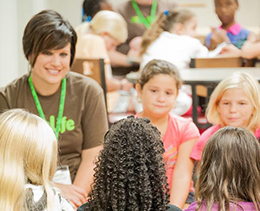Three Cautions in Evangelistic Calls for Children
When I was growing up, my younger sister and I looked forward to 5-Day Clubs every summer. One particular time, the teacher said, “Everyone close your eyes. Raise your hand if you would like to pray to trust Christ.” After a pause, the teacher prayed, saying, “Thank you Lord for that hand that was raised.” It was my sister’s hand. I was so embarrassed. Not because I didn’t want my sister to be saved mind you, but because she had already prayed the prayer multiple times and it seemed like the teacher thought this was the first time. I didn’t want the teacher thinking something that wasn’t true.
When I was growing up, my younger sister and I looked forward to 5-Day Clubs every summer. One particular time, the teacher said, “Everyone close your eyes. Raise your hand if you would like to pray to trust Christ.” After a pause, the teacher prayed, saying, “Thank you Lord for that hand that was raised.” It was my sister’s hand. I was so embarrassed. Not because I didn’t want my sister to be saved mind you, but because she had already prayed the prayer multiple times and it seemed like the teacher thought this was the first time. I didn’t want the teacher thinking something that wasn’t true.
As an adult I look back on the situation, and wish I had told the teacher that my sister raised her hand every time an evangelistic call was given. It might have been helpful for my sister to have someone explain the gospel to her one on one, or to help her know that she could have assurance of her salvation.
I am all for sharing the gospel with young children, but I would urge teachers to be cautious when giving evangelistic calls. I am not saying to avoid them, but to think carefully about how they are done. Here are a few specific cautions I’ve learned over the years.
- Be careful when asking for a show of hands—Be very clear that one is not saved by raising one’s hand. Also, be aware, if one child raises a hand, it can set off a chain reaction. There have been some teaching scenarios where every child raised his or her hand. Which ones were legit and which were copy cats? It can be nearly impossible to tell. I suggest saying, “If you would like to learn more about putting your trust in Christ, talk to me or one of the other teachers after the lesson.” One on one time with a child interested in the gospel is essential. That way you can determine where a child is at spiritually and answer any questions he or she may have.
- Be careful not to convey the idea that a prayer saves people.—Prayer does not save anyone. Prayer is just a way to tell God that you are trusting in Christ as your Savior.
- Be careful of the phrase, “Ask Jesus into your heart.”—This phrase can be misleading and cause confusion in children who may take the phrase literally. Besides, that is not how the Bible words the call for salvation. The only place in the bible that uses that terminology is Revelation 3:20, but a careful look at the context reveals the phrase appears to be addressed to believers.
Now I am not saying that children cannot be saved if any of these phrases are used, but that they are not the best phrases to use. In sharing the gospel, clarity is essential.


